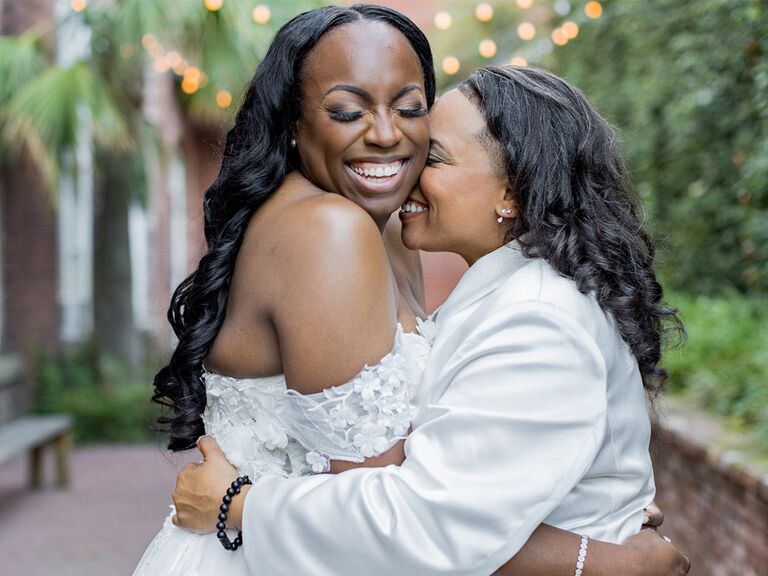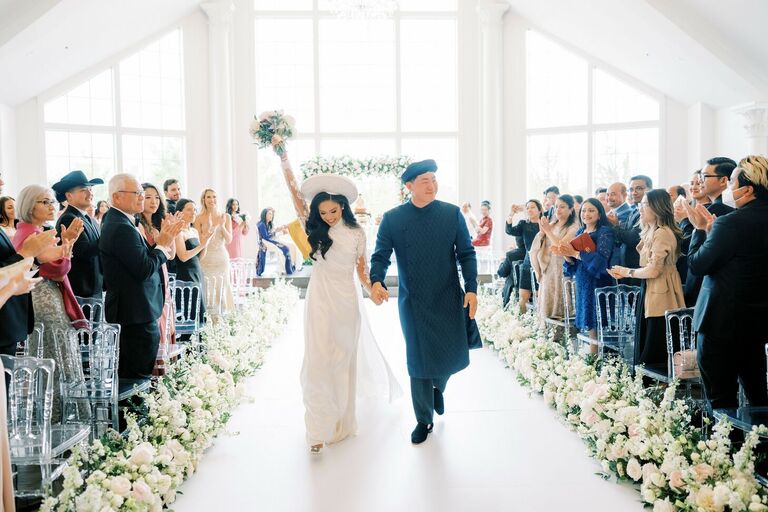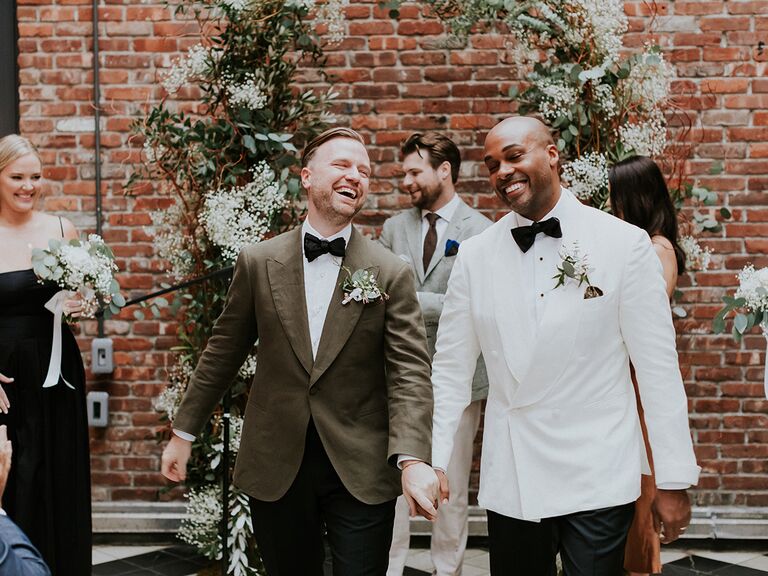The Average Wedding Cost, According to Data
Every year, The Knot Real Weddings Study reveals the average wedding cost and more official data per state. About 12,000 couples across the country participated in the study, and shared details on what wedding planning looks like right now. Here's the headline: While it seems that the effects of COVID on the industry have lifted, inflation is having an impact on the overall cost of weddings (and really, the cost of everything at the moment).
Based on couples' answers involving spend on ceremony and reception, the national average cost of a wedding is $30,000, which is a $2,000 increase from last year's national average.
The great news? Weddings have recovered from COVID's impact. According to the Real Weddings Study, 93% of weddings took place on their original date and were not postponed due to COVID. However, inflation is causing costs to increase across the board—high demand paired with shortages is making for a tricky situation. However, with the help of expert vendors on The Knot and staying focused on what's important, couples are still able to throw an amazing wedding day.
In this article:
- Average Cost of a Wedding in the U.S. by State
- Average Cost of Wedding Vendors
- Average Wedding Cost By Number of Guests
- How Has the Cost of Weddings Changed Over the Years?
- What Does This Mean for Weddings in 2024?
Average Cost of a Wedding in the U.S. by State
So you're probably wondering—how does this all affect my wedding budget? The cost of your wedding will likely depend on a variety of factors, including the number of guests, number of vendors hired, style and, perhaps most significantly, where your big day takes place. Throwing a wedding in a densely populated, expensive destination (a big city like New York City, San Francisco or Chicago, for example) costs more than it does in a smaller or less populated location (such as Idaho, West Virginia or Wyoming).
To get a better idea of what you can expect to spend in your chosen wedding destination, see our list of average wedding costs in the U.S. by state (excluding Alaska and Hawaii), below. Note that this is just the cost of the ceremony and reception, and doesn't include the engagement ring, which costs $6,000, on average.
- Alabama: $22,000
- Arkansas: $21,000
- Arizona: $23,000
- California: $37,000
- Colorado: $30,000
- Connecticut: $39,000
- Delaware: $39,000
- DC: $40,000
- Florida: $30,000
- Georgia: $26,000
- Idaho: $19,000
- Illinois: $37,000
- Indiana: $23,000
- Iowa: $19,000
- Kentucky: $20,000
- Kansas: $16,000
- Louisiana: $31,000
- Maine: $31,000
- Maryland: $39,000
- Massachusetts: $46,000
- Michigan: $27,000
- Minnesota: $25,000
- Mississippi: $28,000
- Missouri: $23,000
- Montana: $18,000
- Nebraska: $21,000
- Nevada: $21,000
- New Hampshire: $30,000
- New Jersey: $51,000
- New Mexico: $18,000
- New York: $46,000
- North Carolina: $29,000
- North Dakota & South Dakota: $20,000
- Ohio: $26,000
- Oklahoma: $16,000
- Oregon: $19,000
- Pennsylvania: $33,000
- Rhode Island: $43,000
- South Carolina: $32,000
- Tennessee: $22,000
- Texas: $27,000
- Utah: $16,000
- Vermont: $43,000
- Virginia: $31,000
- Washington: $23,000
- West Virginia: $31,000
- Wisconsin: $26,000
- Wyoming: $18,000
If you're considering a destination wedding, it's worth noting that these events tend to be more slightly more expensive than hometown events. According to the Real Weddings Study, couples who hosted a destination spent an average of $35,600 as compared to about $29,000 for a hometown wedding. Destination weddings that took place in the U.S. ("domestination weddings") cost $36,400, while weddings abroad cost an average of $32,100. While destination weddings tend to be smaller than hometown weddings, the cost of travel, accommodations and other expenses can drive up the budget.
Couples are also tapping professionals to help them pull it all off, as our study shows that over a third of couples hired some form of a wedding planner (whether it be a day-of coordinator or a full-service planner). Many wholeheartedly embrace or blend their cultural customs, while others intentionally turn tradition on its head by paying homage to pop culture (Harry Potter stilettos, anyone?), nixing old-school activities (like the garter toss) or reinventing big moments to suit their individual style (think: tequila shot unity ceremonies). Today's couples want their wedding to be a true expression of their unique love story and for guests to leave saying, "That was so them."
Speaking of guests, the average wedding guest count was 117 guests, which was an increase from the 2021 average of 105 guests, and approaching the pre-COVID 2019 guest count of 131. While couples are no longer forced to cut their guest list due to COVID concerns, many couples are doing so because of the current economic situation. In fact, 39% of couples trimmed their guest list by cutting 25 people on average to potentially adjust for inflation.
And, of course, no wedding can happen without an entire team of incredible vendors. To-be-weds continue to lean on best-in-class local pros to make their wedding day unforgettable, whether it's a macramé artist for bespoke bohemian wall décor or the perfect planner to bring their Jewish-Chinese fusion celebration to life.
Average Cost of Wedding Vendors
The number of vendors hired is one of the most important factors in determining the total cost of a wedding. According to our data, couples hired 14 wedding vendors on average, which is on par with pre-pandemic data. And of course, how much wedding venues and pros charge varies—a lot. It's always best to research wedding vendors in your area and ask them about their specific rates (and what those rates include). An internal study found out exactly what couples spend on different wedding vendors last year on average. See the average cost of wedding vendors below:
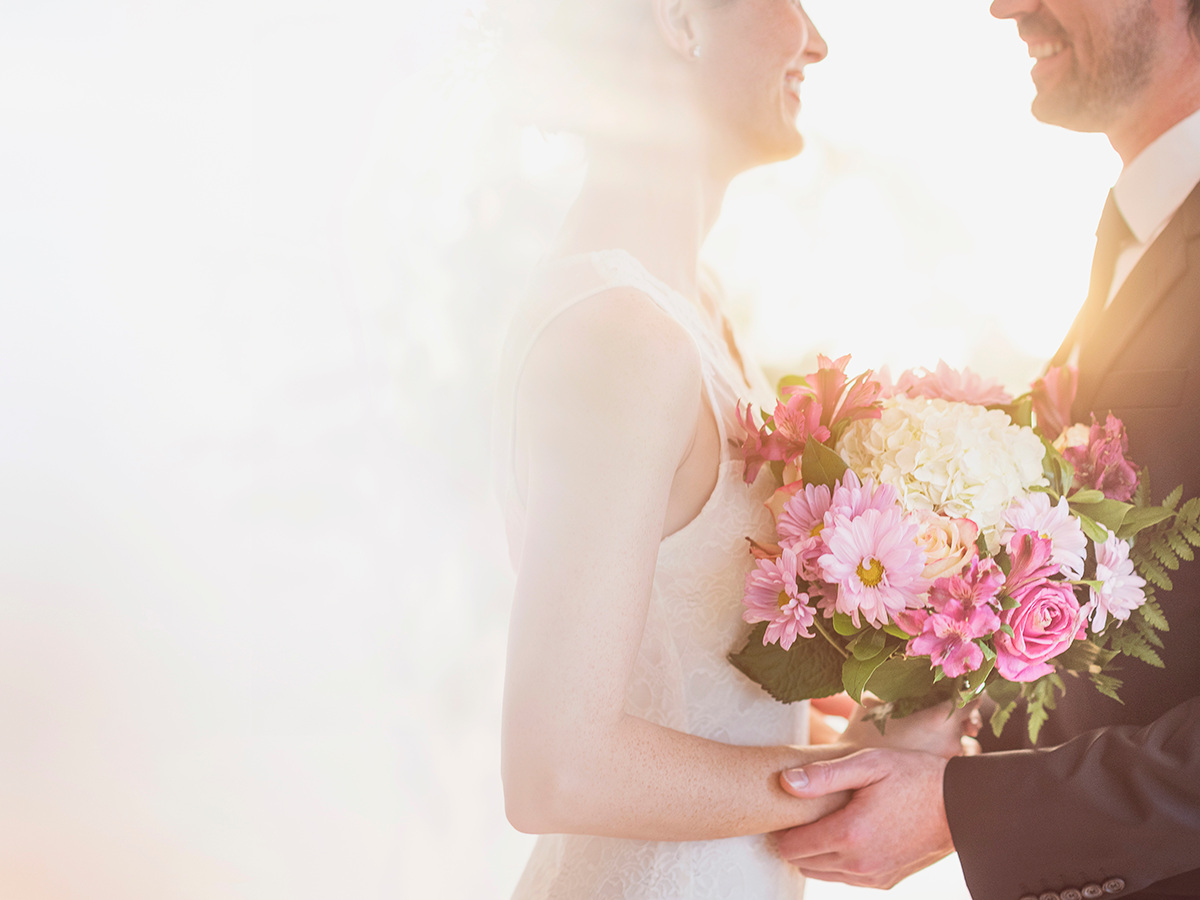
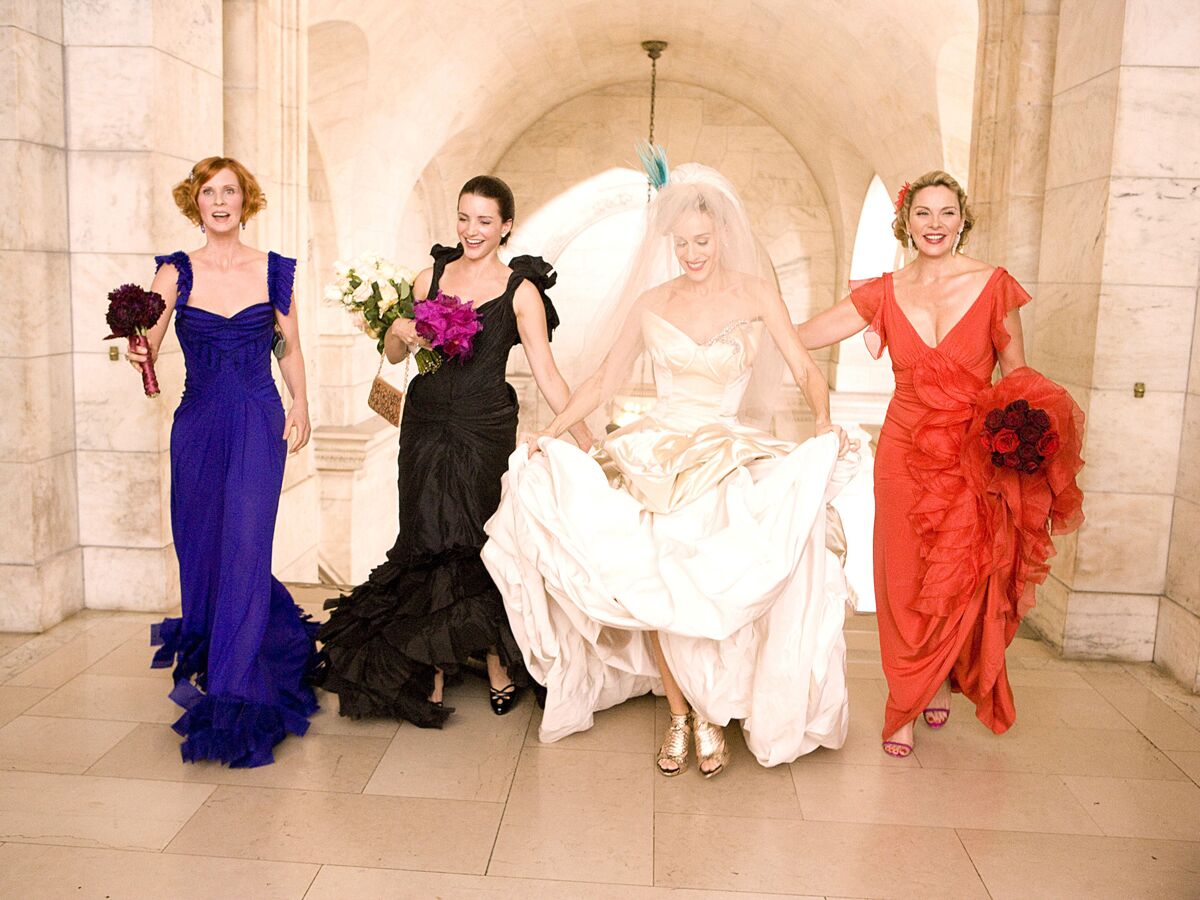

- Average cost of reception venue: $11,200
- Average cost of wedding photographer: $2,600
- Average cost of wedding/event planner: $1,900
- Average cost of live band: $3,900
- Average cost of reception DJ: $1,500
- Average cost of florist: $2,400
- Average cost of videographer: $2,100
- Average cost of wedding dress: $1,900
- Average cost of wedding cake: $510
- Average cost of catering: (price per person): $75
- Average cost of transportation: $980
- Average cost of favors: $440
- Average cost of rehearsal dinner: $2,400
- Average cost of engagement ring: $5,800
- Average cost of wedding invitations: $510
- Average cost of hairstylist: $130
- Average cost of makeup artist: $120
Average Wedding Cost By Number of Guests
One of the biggest factors in determining how much you'll spend on your wedding is your guest list. It goes without saying, but the more people you invite, the more you'll spend—and here's the proof. According to our study, couples who invited 50 or fewer guests spent an average of $14,400 on their wedding. Those who invited between 51 and 100 people spent $24,600, on average, and those with bigger events of more than 100 guests spent an average of $38,100 on their total wedding cost. So if you're looking to cut down on wedding expenses, trimming your guest list is a good place to start.
Another way to save money on your wedding? Having a smaller wedding party. While wedding party members typically pay for many of their own expenses, the couple is on the hook for bouquets, boutonnieres, gifts and more. According to the Real Weddings Study, the average wedding party had eight members, so if you're able to come in below that, it could help with cost savings.
How Has the Cost of Weddings Changed Over the Years?
The average wedding cost of $30,000 is slightly higher than in past years due to inflation. With the exception of a COVID-related dip in 2020, the average cost of a wedding has remained at about $28,000 consistently since 2017. In 2016, the average spend on weddings was $29,000, also a time of economic uneasiness and recession. In 2015, couples spent over $2,000 less, averaging $26,800 for their weddings. The average cost of a wedding in 2014 was $25,400.
What Does This Mean for Weddings in 2024?
If you're planning a wedding in 2024, you're probably wondering what all this means for your upcoming event. Well, it means that you'll likely see higher costs for certain wedding products and services and there may be a few details affected by shortages. That being said, it's absolutely possible to throw the wedding of your dreams during a time of inflation. Here's our best advice for planning a wedding right now:
Start planning early.
The earlier you can start to plan, the better. You'll have your pick of venues and wedding pros that fit your budget, rather than scrambling to find someone that works within your desired price range. You'll also be able to lock in prices for certain products and services now, so that even if inflation drives rates up, your contract will stay the same. Additionally, tighter planning timelines mean rush fees and other last-minute charges that drive costs up.
Set your budget—and leave some wiggle room.
Sit down with your partner and any financial contributors (family members, etc.) to create a realistic total wedding budget. If possible, reserve 5% of your budget as a "just in case" fund to help avoid overspending (which is very common, btw—more than half of those surveyed went over budget). We also recommend using an online budget tool to keep track of your spending during the planning process.
List your priorities.
Work with your partner to come up with a wedding mission statement and figure out what's most important. This may be having amazing food and a killer band, or going over-the-top on flowers and decor. This list of priorities will help you make decisions and decide where to splurge and save as you plan.
Hire a star vendor team (and a planner!).
A team of expert wedding pros will help turn your vision into reality—within your budget! In particular, a wedding planner will ensure that you stay on track throughout the planning process and source vendors that are within your price range. Yes, a planner may be an additional expense, but it's well worth it.
Be flexible.
With the higher costs and shortages hitting the wedding industry, flexibility is key. Yes, you may be obsessed with peonies but if your florist suggests less-expensive blooms to help you save, be open to the idea. Listening to your vendors and trusting their expertise is especially important right now—remember, they're here to help!
